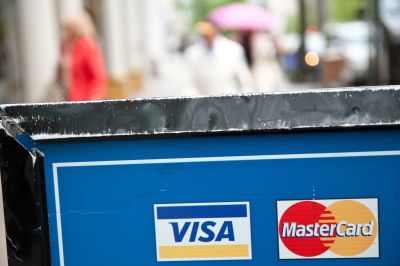Ask Chuck: How to get credit card debt under control
Dear Chuck,
I hate carrying a balance on our credit cards, but I can’t seem to get them under control. I need some help!
Carrying Heavy Balances
Dear Carrying Heavy Balances,

Unfortunately, inflation is harming the financial situation of many Americans. Rising credit card debt is one of the obvious indicators that millions of others are experiencing the same challenge you are having!
A national trend
Americans owe approximately $887 billion on their credit cards —13% higher than a year ago. According to the Federal Reserve Bank of New York, credit card debt is rising at its fastest pace in more than 20 years.
It’s been reported that 46% of Americans have credit card debt. 43% say they depend on theirs to cover essential living expenses. They owe an average of more than $6,000. Four in five Americans with credit card debt also carry debt in the form of auto loans, student loans, medical bills, and a mortgage. The Washington Post reports that credit card borrowers are also taking longer to pay off their debt. Any gains made with stimulus money were wiped out by higher prices for gas and groceries, as well as rising interest rates.
The problem with credit card debt is the accompanying high-interest rate. When a balance is carried, the total grows each month. Ted Rossman, senior industry analyst for CreditCards.com, reports that those who have been in credit card debt for at least a year increased by 10% from last year. He notes that minimum payments at 18.17% interest on a credit card balance of $5,270 will take 16 years to pay off at the cost of $11,875.
Getting out of the high-interest debt trap
It is probably your goal, too, but I recommend eliminating credit card debt as soon as possible! This Crown article has several methods that you can use.
According to creditcards.com, the average credit card interest rate on October 26th was 18.91%. As federal interest rates rise, the average APR (annual percentage rate) for new cards is expected to reach 19.66% by winter. Many will pay more than that. Data reveals that the average credit card offer advertises a maximum APR of 26.36%. Last year, the prime rate was 3.25%, but it was 6.25% on 10/26. The Fed will continue to hike rates until they get inflation under control. This will negatively impact those who carry credit card balances because debt will cost more.
Reduce your interest rate
To secure a lower APR, creditcards.com recommends the following:
- Pay your bills on time. This is the single most important factor influencing your credit score, which impacts the APR you are assigned.
- Keep your credit balances low. Aim for balances below 30% of your total credit limit. This shows creditors that you are responsible.
- Build a lengthy and diverse credit history to show your experience.
- Call your card issuers. If you have owned a credit card for a long time and have excellent credit, you may be able to negotiate a lower rate.
- Monitor your credit report to make sure things are accurate. You have the right to check a free annual credit report from the three major credit bureaus: Equifax, Experian, and TransUnion. Free weekly credit reports are provided through 2023 due to the pandemic.
- While you are in contact with the credit bureaus, you can ask for a free “credit freeze” to prevent others from accessing your credit through identity theft.
Reduce expenses and spending habits
- Stop overspending on credit cards.
- Stop using ATMs out of your network to avoid charges.
- Cut unnecessary spending.
- Use cash envelopes for variable spending: groceries, entertainment, haircuts, etc.
- Adjust your lifestyle: car, home, club memberships, vacations, etc.
- Drop all streaming services until you have reduced your balances.
- Consider a balance transfer that offers 0% interest if you can pay off the balance before the offer expires. Read the fine print.
- Resolve to have a debt-free Christmas.
Reduce the need for debt
- Create a budget and set goals.
- Learn basic financial principles.
- Avoid places where you will be tempted to spend money.
- Resolve to make no impulsive purchases by waiting at least 24 hours.
- Avoid making big decisions when extremely emotional.
- Limit exposure to advertising and social media.
- Delete or unsubscribe from sites where time is wasted and temptation lurks.
- Replace unnecessary time on the computer and phone with productive use of time.
- Exercise or spend quality time with friends instead of shopping.
- Be accountable to your spouse or mentor.
- Spend time in God’s Word daily.
Big idea
Serve as your own banker and avoid paying credit-related interest and fees. Start by saving $1,000 and increase this as you are able until you have 3–6 months of living expenses in an emergency savings account. This will eliminate your need to use credit cards in the future. You simply pay cash and replenish your savings by paying yourself back!
By starting with a small discipline, you will find you will become more disciplined in all areas of managing money. Remember the words Jesus taught His disciples: “One who is faithful in a very little is also faithful in much…” (Luke 16:10a ESV)
Consider contacting Christian Credit Counselors if you need outside support with the financial pain of credit card debt. They are a trusted source of help toward financial freedom.
Chuck Bentley is CEO of Crown Financial Ministries, a global Christian ministry, founded by the late Larry Burkett. He is the host of a daily radio broadcast, My MoneyLife, featured on more than 1,000 Christian Music and Talk stations in the U.S., and author of his most recent book, Economic Evidence for God?. Be sure to follow Crown on Facebook.






















